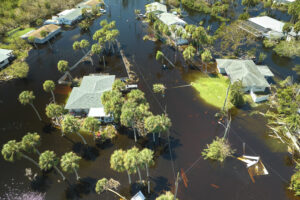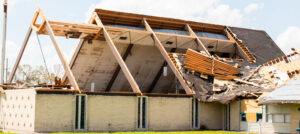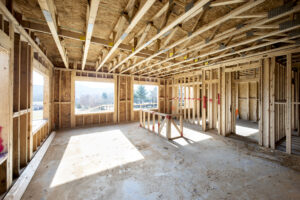
Joint Study Examines the Influence of Building Codes on Mortgage Delinquency After Hurricanes
Researchers found that the adoption of modern building codes, like the IBC and IRC, is statistically significant in reducing mortgage delinquency rates after a hurricane.
In today’s changing climate, hurricanes are becoming more prevalent and destructive than ever before. It’s not just the bigger cyclones that are strengthening – research shows that weak tropical cyclones, including tropical storms and low-category hurricanes, are growing stronger as well.
With this in mind, it has become increasingly important that communities are well prepared to mitigate the potential damage and loss of life inflicted by these catastrophic weather events. If a community is not prepared, there can be major consequences both physical and financial.

According to the Federal Emergency Management Agency (FEMA), one of the most cost-effective ways to safeguard citizens and communities against disasters is to adopt and follow hazard-resistant building codes, such as the International Building Code® (IBC) and International Residential Code® (IRC).
Understanding that building codes could help mitigate physical damage during a landfalling hurricane, the Insurance Institute for Business & Home Safety (IBHS) and CoreLogic® also investigated if this risk management strategy could be used to help mitigate financial losses.
Studying The Influence of Building Codes on Mortgages
It has become evident that natural disasters contribute to financial risk in the mortgage market due to their effects on both borrowers and lenders. For example, hurricanes can cause extensive damage to homes or properties, which can lead to homeowners being unable to make mortgage payments due to financial hardships caused by repairs or a loss of income.
Through a joint study conducted by IBHS and CoreLogic, researchers explored how building codes, like the International Codes® (I-Codes), their history, and their adoption can impact mortgage payment performance after landfalling hurricanes.
The study examined four major hurricanes and the impacted regions consisting of diverse building ages, code adoption and enforcement history.
The studied hurricanes, all similar in type and scale, included:
- Hurricane Irma, 2017
- Hurricane Harvey, 2017
- Hurricane Michael, 2018
- Hurricane Laura, 2020

After deciding which hurricanes to study, researchers then examined the history of building code adoptions in the affected regions. By focusing on key milestones in code improvements, seven building code eras were created; individual properties were then assigned to an era based on which codes were adopted when the property was constructed.
The determined code eras were:
- Pre- 1950
- 1950-1977
- 1978-1988
- 1989-2000
- 2001-2006
- 2007-Present
- No Codes or Unknown
By combining the building code data with the property data on loan payment performance, loan/borrower underwriting characteristics, home asset and structure characteristics and forensic wind speeds at a location during a storm, researchers were able to study the correlation between the code era adoption, wind damage and mortgage default.
Understanding the Impact of Building Codes on Mortgages
Through this study, researchers found that the adoption of modern building codes, like the IBC and IRC, is statistically significant in reducing mortgage delinquency rates after a hurricane and will ultimately strengthen the resiliency of families and the financial sector at large.

The key research findings illustrated:
- The least risky borrowers were in homes built under the code era from 2007 to the present day.
- The code era group with the oldest homes, which have little in the way of building codes, showed the highest delinquency rates post-hurricane.
- Homes built in the late 1970s and early 1980s were also quite vulnerable. During this era, homes were often built quickly with little code adoption, and the codes that did exist were insufficient.
- Stronger building code regimes distinguish statistically significant favorable borrower behavior.
SEE RELATED: Accessing Hurricane Ian Damage on Beachfront Homes (1946 vs. post-2020)
Access the full study here.
Adopting and Implementing Modern Building Codes and Standards
As the frequency and severity of hazardous events increase, the need to prioritize the adoption and implementation of modern building codes and standards has caused the federal government to create federal grants to support code-related activities.
The International Code Council is readily available to help guide state, local, tribal and territorial governments in accessing these grant funds.
To learn more about Federal Grant Opportunities and how to garner support through the Code Council, click here.
To learn more about the Code Council’s I-Codes, click here.







